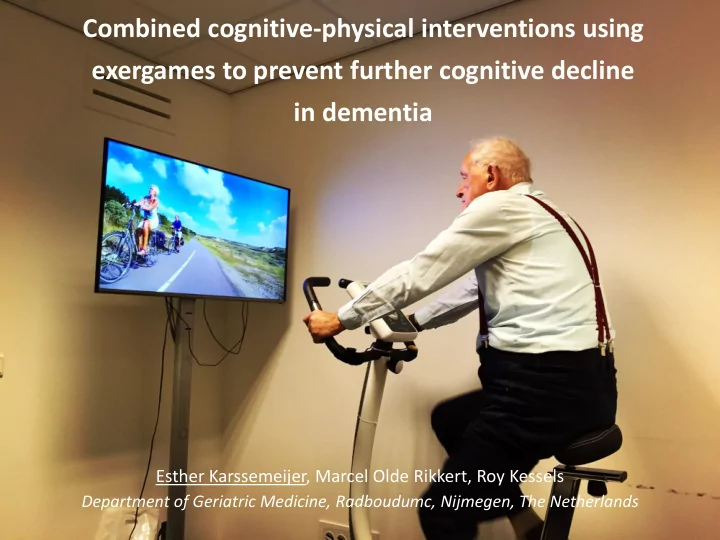

Combined cognitive-physical interventions using exergames to prevent further cognitive decline in dementia Esther Karssemeijer, Marcel Olde Rikkert, Roy Kessels Department of Geriatric Medicine, Radboudumc, Nijmegen, The Netherlands
CONFLICT OF INTEREST DISCLOSURE I have no potential conflict of interest to report
¹ ² ¹ Stern (2012), ² Ott (1995)
Content of this presentation 1. Physical activity (PA) as a non-pharamacological intervention 2. Combining cognitive-physical training 3. Exergames 4. Our research design 5. Use of exergames for patients with dementia
Physical activity • Positive effects on cognitive function in healthy elderly 3 • Brainstructure 4,5 • hippocampal size • White matter integrity • Neurogenesis, angiogenesis 6 • IGF-1, BDNF, VEGF 7 7 • 7 Prevent cognitive decline in dementia? ³ Angevaren et al. (2008), 4 Colcombe et al. (2006), 5 Erickson et al. (2011), 6 Nokia et al. (2016), 7 Lista et al. (2010)
Modifiable risk factors for dementia 8 8 Livingston et al. (2017)
Recommendations 9 Physical inactivity (<3 MET) RISK! 10 Sedentary behaviour (<1.5 MET ) 150 min/week 9 WHO (2010), 10 Ekelund et al. (2016)
Combined cognitive-physical interventions • Additive effects 11 • Prime hippocampus 12 Cell survival 12 Cell proliferation • Improves cognition in healthy older adults 13 11 Shatil et al. (2013), 12 Olson et al. (2006), 13 Zhu et al. (2016)
Meta-analysis 14 What is the overall effect of combined cognitive and physical exercise interventions on global cognitive function in older adults with MCI or dementia ? 14 Karssemeijer et al. (2017)
Studies • 10 RCT’s • 5 in dementia patients 1687 records • 3 in MCI screening • 2 in patients with MCI 1597 excluded or dementia based on Outcome measures title/abstract • Global cognitive function (10 90 full text studies) screening • Executive function and attention (3 studies) • 80 excluded Memory (3 studies) • Activities of Daily Living (ADL) (4 studies) • Mood (4 studies) 10 studies included
Effect on mood 14 Effect on global cognition 14 Effect on activities of daily living 14 14 Karssemeijer et al. (2017)
Exergames Opportunities for combining actions
Exergames • Interactive video games • Produce physical body movements • To complete set tasks or actions 15 • Evidence that they can improve global cognition 16 • Effect in dementia? 15 Oh en Yang (2010), 16 Stanmore et al. (2017)
Our research question 17 What is the efficacy of exergaming on cognitive function in older adults with mild dementia compared to: single-aerobic training and active control group 17 Karssemeijer et al. (2017)
Participants • Mild dementia patients • Age ≥ 60 years • Being physical inactive Measurements • Cognitive function o executive function o episodic memory o working memory o psychomotor speed • Physical function • Activities of daily living (ADL) • Mood • Frailty
Feasibility Exergaming (N=27) Single (N=28) Active control (N=28) M Age (years) (SD) 78.4 (7.0) 80.7 (6.4) 79.5 (4.3) M MMSE (SD) 22.7 (3.5) 22.6 (3.4) 22.3 (2.9) N Drop-out (%) 1 (4%) 4 (14%) 4 (14%) N Adherence-rate (%) low (< 50%) 1 (3.7%) 3 (10.7%) 4 (14.3%) moderate (50-70%) 2 (7.4%) 6 (21.4%) 1 (3.6%) high (> 70%) 24 (89%) 19 (68%) 23 (82.1%) M Rating (1-10) (SD) 7.7 (1.0) 8.4 (0.9) 8.3 (0.8) M Duration (SD) 31 (7.3) 31 (7.3) 30
“ Sometimes I did not feel like exercising, “ Going to the “My loved one but afterwards I was got more active training was a nice glad I did it.” and social .” outing for my loved one, and gave me some time for myself .” “ Next training I would like to cycle through my home town .” “My loved one got “ Exercise gives more fit and me a pleasent cheerful due to feeling.” training.”
Use of exergames for dementia 18 1. Personalized 2. Accompanied by a trained (family) caregiver 3. Use of exergames at home and in clinical settings a. feasibility studies are needed 18 Manera et al. (2017)
Thank you for your attention
E- QUESTIONS?
Recommend
More recommend